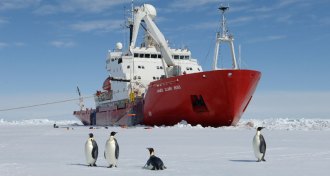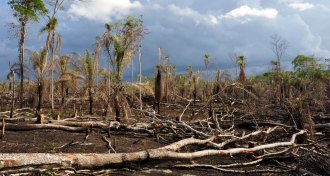Earth
Sign up for our newsletter
We summarize the week's scientific breakthroughs every Thursday.
-
 Oceans
OceansHere’s a breakdown of the animals that crossed the Pacific on 2011 tsunami debris
Hundreds of marine animals from Japan have washed up on U.S. beaches since the destructive 2011 earthquake and tsunami.
-
 Earth
EarthWhen the Larsen C ice shelf broke, it exposed a hidden world
Scientists plan urgent missions to visit the world the Larsen C iceberg left behind.
-
 Climate
ClimateDuring El Niño, the tropics emit more carbon dioxide
El Niño increases carbon emissions from the tropics — mimicking future climate change.
-
 Animals
AnimalsNew deep-sea sponge could play a starring role in monitoring ocean health
A new species of sponge that dwells on metal-rich rocks could help scientists track the environmental impact of deep-sea mining.
-
 Agriculture
AgricultureMuch of the world’s honey now contains bee-harming pesticides
A controversial group of chemicals called neonicotinoids has a global impact, tests of honey samples show.
-
 Plants
PlantsJosé Dinneny rethinks how plants hunt for water
Plant biologist José Dinneny probes the very beginnings of root development, which may have important implications for growing food in a changing climate.
By Susan Milius -
 Chemistry
ChemistryChong Liu one-ups plant photosynthesis
Chong Liu mixes bacteria and inorganics into systems that can generate clean energy better than a leaf.
-
 Environment
EnvironmentRadioactive material from Fukushima disaster turns up in a surprising place
Radioactive cesium is reaching the ocean through salty groundwater.
-
 Oceans
OceansCastaway critters rafted to U.S. shores aboard Japan tsunami debris
Researchers report finding 289 living Japanese marine species that washed up on American shores on debris from the 2011 East Japan earthquake and tsunami.
-
 Climate
ClimateTropical forests have flipped from sponges to sources of carbon dioxide
Analyses of satellite images suggest that degraded forests now release more carbon than they store.
-
 Environment
EnvironmentThe way poison frogs keep from poisoning themselves is complicated
Gaining resistance to one of their own toxins forced some poison dart frogs to make other genetic tweaks, too.
-
 Earth
EarthPlate tectonics started at least 3.5 billion years ago
Analyses of titanium in rock suggest plate tectonics began 500 million years earlier than thought.